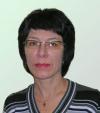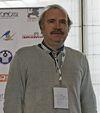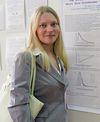References
- Baktybaev Z. S. Use of Bloom's taxonomy technology in the university educational process. In: Yaroslavskii pedagogeskii vestnik. 2017. № 1. P. 150–153. (In Russ.)
- Golaydo I. M. The system of higher education and the region economy. In: Obrazovanie i nauka bez granits: fundamentalnye i prikladnye issledovaniya [Education and science without borders: fundamental and applied research]. 2017. Vol. 5. P. 129–132. (In Russ.)
- Ershova N. Y., Nazarov A. I. Practices of application of topical electronic resources for preparation of masters. In: Uchenye zapiski Instituta socialnyh i gumanitarnyh znanii. 2017. № 1 (15). P. 221–227. (In Russ.)
- Konovalova E. A. Integrational interrelations of education, science and industry as a factor of modern Russian society progress. In: Izvestia vysshih uchebnyh zavedenii. Povolzhskii raion. Gumanitarnye nauki. Filosofiya. 2013. № 2 (26). P. 79–86. (In Russ.)
- Nazarov A. I., Sergeeva O. V. The advantages of distance learning technologies: students’ and university lecturers’ views. In: Otkrytoe obrazovanie. 2016. № 6. P. 42–50. (In Russ.)
- Nurutdinova A. R. Main directions in integration of science, education and industry. In: Sovremennye obrazovatelnye tehnologii. 2012. № 4. P. 24–27. (In Russ.)
- Serditova N. E., Belocerkovskii A. V. Education, quality and the digital transformation In: Vysshee obrazovanie v Rossii. 2020. № 4. P. 9–15. (In Russ.)
- Shutaleva A. V. et. al. Humanization of education in digital era. In: Perspektivy nauki i obrazovania. 2019. № 6 (42). P. 31–43. Electron dan. DOI: 10.32744/pse.2019.6.3. (In Russ.)
- Gavrilova I. V. et. al. The concept and charactristics of cognitive economy, neccessary conditions for its formation [Electronic resource] In: Molodoi uchenyi. 2016. № 10 (114). P. 655–659. Electron dan. URL : https://moluch.ru/archive/114/29877/ (date of acсess: 06.02.2021). (In Russ.)
- Dautova O.V. et. al. Mass blended learning format how to move towards digital education. In: Nepreryvnoe obrazovanie: XXI vek. 2020. № 3 (31). DOI: 10.15393/j5.art.2020.6045. (In Russ.)
- Dementev D. V. Interconnection of educational and professional standards [Electronic resource]. In: Uchet. Analiz. Audit. 2018. Vol. 5. № 3. P. 120–127. Electron dan. DOI: 10.26794/2408-9303-2018-5-3-120-127 (date of acсess: 06.02.2021). (In Russ.)
- Ershova N. Yu. Education for high-tech industries [Electronic resource]. In: Obrazovatelnaya politika. 2020. № 4. P. 106–107. Electron dan. URL: https://edpolicy.ru/high-tech-industries/ (date of acсess: 06.02.2021).
- Listvin A. A. Dual training in Russia: from the concept to practice [Electronic resource]. In: Obrazovanie i nauka. 2016. № 3. P. 44–56. Electron dan. DOI: 10.17853/1994–5639–2016–3–44–56 (date of acсess: 06.02.2021). (In Russ.)
- The letter of the Ministry of education and science RF August, 28, 2015 № АК-2563/05 «On methodological recommendations» [Electronic resource]. In: Informatsyonno-pravovoi portal GARANT.RU. Electron dan. URL: https://www.garant.ru/products/ipo/prime/doc/71075428/ (date of acсess: 06.02.2021).
- Romanova I. N. et. al. Continuous education in training of specialists in modern conditions. In: Vestnik Bashkirskogo universiteta. 2019. Vol. 24. № 3. P. 754–758. DOI: 10.33184/bulletin-bsu-2019.3.37. (In Russ.)
- Arkannikova M. S., Kondin B. I. Russian engineering education in the context of the social demand transformation [Electronic resource]. In: The European Proceedings of Social & Behavioural Sciences. 19th Professional Culture of the Specialist of the Future (PCSF 2019). 2019. P. 601–617. Electron dan. DOI: https://doi.org/10.15405/epsbs.2019.12.65 (date of acсess: 06.02.2021)
- Baygusheva I. A. et. al. Smart-technologies in creation of open system of professional education in Russia [Electronic resource]. In: The European Proceedings of Social & Behavioural Sciences. International Conference on Research Paradigms Transformation in Social Sciences (RPTSS 2018). 2018. P. 516–524. Electron dan. DOI: https://dx.doi.org/10.15405/epsbs.2018.12.61 (date of acсess: 06.02.2021).
- Hodgson A. et. al. Beyond employer engagement and skills supply: building conditions for partnership working and skills co-production in the English context [Electronic resource]. In: Journal of Education and Work. 2019. № 32 (1). P. 36–51. Electron dan. DOI: https://doi.org/10.1080/13639080.2019.1593331 (date of acсess: 06.02.2021).
- Nazarov A. I. et. al. Network form development to implement life-long education [Electronic resource]. In: European proceedings of social and behavioural sciences (EPSBS). 2020. № 90. P. 930–946. Electron dan. DOI: https://www.europeanproceedings.com/proceedings/EpSBS/volumes/icest2020 (date of acсess: 06.02.2021).















